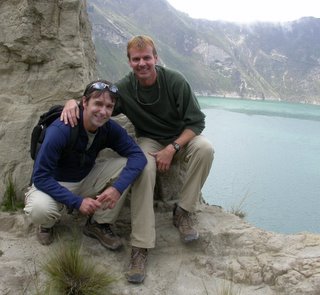Global warming: solution denial
One reason the global-warming problem seems so daunting is that the success of previous antipollution efforts remains something of a secret. Polls show that Americans think the air is getting dirtier, not cleaner, perhaps because media coverage of the environment rarely if ever mentions improvements. For instance, did you know that smog and acid rain have continued to diminish throughout George W. Bush’s presidency?One might expect Democrats to trumpet the decline of air pollution, which stands as one of government’s leading postwar achievements. But just as Republicans have found they can bash Democrats by falsely accusing them of being soft on defense, Democrats have found they can bash Republicans by falsely accusing them of destroying the environment.
[snip]
Some of these problems once seemed scary and intractable, just as greenhouse gases seem today. About forty years ago urban smog was increasing so fast that President Lyndon Johnson warned, “Either we stop poisoning our air or we become a nation [in] gas masks groping our way through dying cities.” During Ronald Reagan’s presidency, emissions of chlorofluorocarbons, or CFCs, threatened to deplete the stratospheric ozone layer. As recently as George H. W. Bush’s administration, acid rain was said to threaten a “new silent spring” of dead Appalachian forests.
But in each case, strong regulations were enacted, and what happened? Since 1970, smog-forming air pollution has declined by a third to a half. Emissions of CFCs have been nearly eliminated, and studies suggest that ozone-layer replenishment is beginning. Acid rain, meanwhile, has declined by a third since 1990, while Appalachian forest health has improved sharply.
[snip]
Yet a paralyzing negativism dominates global-warming politics. Environmentalists depict climate change as nearly unstoppable; skeptics speak of the problem as either imaginary (the “greatest hoax ever perpetrated,” in the words of Senator James Inhofe, chairman of the Senate’s environment committee) or ruinously expensive to address.
Two thoughts:
-- One the problems now is that technology fixes have been so fantastically effective in the past. People heard about air pollution, ozone depletion, and acid rain. They don't understand the fixes to these problems, so they think the warnings were false scarces to begin with. It's no wonder that the big denial book on global warming was written by Michael Crichton, whose whole schtick is that the "experts" don't know nearly as much as you and me.
This could be a classic law of unintended consequences. Perhaps if technology hadn't been so good at heading off these previous problems -- if the Appalachian forests really did die and spawn massive forest fires -- people wouldn't be so fatuous to environmental warnings.
-- Air pollution, acid rain. and ozone depletion were problems that could be fixed quickly after physical detection. People could see (or see on TV) the effects of air pollution and acid rain. They could be presented with incontrovertible facts on oxone depletion. Once these problems were accepted and the solutions implemented, the problems were quicklt solved.
Perhaps this will be true with CO2 and methane build up in the atmosphere as well. But Co2 and methane seem a lot more like an oil tanker than a sail boat -- it will take century, not a decade or less, to turn it around once the problem is manifest.


<< Home